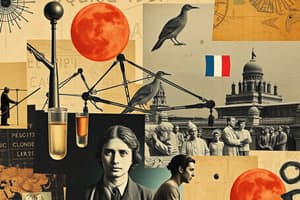Podcast
Questions and Answers
What does Coulomb's law describe?
What does Coulomb's law describe?
- The gravitational force between two masses.
- The electrostatic force between stationary point charges. (correct)
- The magnetic force between two magnets.
- The electrostatic force between moving charges.
How can a scientific theory be characterized?
How can a scientific theory be characterized?
- It cannot be changed once established.
- It consists of untested hypotheses and assumptions.
- It synthesizes well-tested hypotheses and laws about the natural world. (correct)
- It only explains specific phenomena.
Which statement best defines the distinction between science and technology?
Which statement best defines the distinction between science and technology?
- Science aims to apply existing knowledge, while technology seeks to create new laws.
- Science is only focused on practical problems, while technology is theoretical.
- Science discovers beauty, while technology is concerned with the human experience.
- Science is focused on explanation, while technology is the application of scientific knowledge. (correct)
What is the primary purpose of scientific models?
What is the primary purpose of scientific models?
In the context of science, how is the study of religion best described?
In the context of science, how is the study of religion best described?
What is the first step of the scientific method?
What is the first step of the scientific method?
Which statement correctly defines a hypothesis?
Which statement correctly defines a hypothesis?
Which of the following statements is a characteristic of scientific laws?
Which of the following statements is a characteristic of scientific laws?
Which of the following best illustrates a scientific hypothesis?
Which of the following best illustrates a scientific hypothesis?
What role does scientific attitude play in discoveries?
What role does scientific attitude play in discoveries?
What happens to a hypothesis that is contradicted by experimental evidence?
What happens to a hypothesis that is contradicted by experimental evidence?
Why might a fact evolve over time?
Why might a fact evolve over time?
What is considered the basic science that forms the foundation for other scientific fields?
What is considered the basic science that forms the foundation for other scientific fields?
Which of the following is a key element in distinguishing observations from inferences?
Which of the following is a key element in distinguishing observations from inferences?
Which of the following best describes the role of inferences in science?
Which of the following best describes the role of inferences in science?
During which period was science as we know it today primarily developed?
During which period was science as we know it today primarily developed?
What is the main focus of life sciences?
What is the main focus of life sciences?
How do the branches of biology and chemistry relate to physics?
How do the branches of biology and chemistry relate to physics?
In what way did the invention of the printing press contribute to the development of science?
In what way did the invention of the printing press contribute to the development of science?
Which of the following is NOT a characteristic of science?
Which of the following is NOT a characteristic of science?
What is the significance of observations in the scientific method?
What is the significance of observations in the scientific method?
Flashcards
Physics
Physics
The basic science that studies how matter and energy interact, including motion, forces, energy, matter, heat, sound, light, and the composition of atoms.
Scientific Method
Scientific Method
A systematic approach used to explore nature and discover its rules, including observation, hypothesis, and experimentation.
Observation
Observation
Directly noticing a condition or event.
Inference
Inference
Signup and view all the flashcards
Hypothesis
Hypothesis
Signup and view all the flashcards
Science
Science
Signup and view all the flashcards
Life Sciences
Life Sciences
Signup and view all the flashcards
Physical Sciences
Physical Sciences
Signup and view all the flashcards
Coulomb's Law
Coulomb's Law
Signup and view all the flashcards
Scientific Theory
Scientific Theory
Signup and view all the flashcards
Scientific Model
Scientific Model
Signup and view all the flashcards
Science vs. Technology
Science vs. Technology
Signup and view all the flashcards
Science, Art, & Religion
Science, Art, & Religion
Signup and view all the flashcards
Falsifiable Hypothesis
Falsifiable Hypothesis
Signup and view all the flashcards
Scientific Law or Principle
Scientific Law or Principle
Signup and view all the flashcards
Scientific Attitude
Scientific Attitude
Signup and view all the flashcards
Fact in Science
Fact in Science
Signup and view all the flashcards
Difference between Observation and Inference
Difference between Observation and Inference
Signup and view all the flashcards
Scientific Method In Action
Scientific Method In Action
Signup and view all the flashcards
Study Notes
Chapter 1: About Science
- Physics is the basic science
- The scientific method includes observation, facts, hypothesis, laws, principles, theories, and models
- Science and technology, and science and religion are also studied
How Old Is Science?
- Science began before recorded history
- People were curious about their environment and sought explanations
- Star patterns, seasons, and environmental predictions allowed for control over environmental factors
A Brief History of Science
- Ancient civilizations like the Egyptians contributed to scientific knowledge
- Greek figures like Aristotle and Pythagoras contributed during the 3rd and 4th centuries BC
- During the Dark Ages, the Chinese charted stars and planets, while Arab nations advanced mathematics and glassmaking
- Modern science developed in the 16th century, aided by the printing press (15th century)
What Is Science?
- The study of nature's rules
- Includes numerous branches
- Life sciences: study of living things
- Botany
- Zoology
- Physical sciences: study of non-living things
- Geology
- Chemistry
- Astronomy
- Physics
- Life sciences: study of living things
What Science Is? (cont.)
- More than just a body of knowledge
- A method to explore nature and discover natural laws
- A tool for solving problems
The Basic Science - Physics
- Studies how matter and energy interact
- Includes motion, forces, energy, matter, heat, sound, light, and atomic composition
- Forms the basis for other sciences
- Chemistry becomes physics at the atomic level
- Biology builds on chemistry, which builds on physics
Inferences & Observations
- Observation involves perceiving conditions
- Inference is a mental process to explain or interpret an observation
- Correctness isn't a defining factor, distinguishing observation from inference
Scientific Method
- A systematic approach in science
- A method for gaining, organizing, and applying knowledge
- Galileo Galilei (1564-1642) and Francis Bacon (1561-1626) are key figures
- Steps in the scientific method:
- Recognize a problem.
- Formulate a hypothesis (a testable guess about a solution).
- Predict the consequences of the hypothesis.
- Perform experiments to test predictions.
- Formulate a general rule organizing problem, hypothesis, and results.
Scientific Attitude
- Not all discoveries are made strictly following the scientific method
- Trial and error, and serendipitous discoveries are important
- Important attitudes include inquiry, experimentation, and humility
Basic Scientific Terms - Fact
- A phenomenon agreed upon by qualified observers
- Not absolute; things considered facts can later be proven incorrect.
- May change in significance over time
Basic Scientific Terms - Hypothesis (cont.)
- Educated guess about an outcome.
- Is not a fact
- Must be testable (falsifiable).
- Could become a law or principle if repeatedly tested and confirmed by many scientists
Examples of Hypotheses
- Atoms are the smallest particles of matter (testable)
- Outer space contains undetected matter (not testable)
- Roman Catholic Pope is holiest (not testable)
Basic Scientific Terms - Law or Principle (cont.)
- A hypothesis that is repeatedly confirmed by many scientists
- Can be changed with new, contradictory evidence
- Describes relationships that can be observed and measured
Examples of Laws and Principles
- Newton's laws of motion describe how force produces motion in objects.
- Coulomb's law describes electrostatic force between charges.
Basic Scientific Terms - Theory (cont.)
- A synthesis of information; well-tested hypotheses, laws, and principles
- Used to explain larger parts of the natural world (e.g., atomic theory)
- Can be updated with new information
Basic Scientific Terms - Models(cont.)
- Similar to theories, but explain specific aspects of the natural world
- Representations of phenomena to explain them more clearly
- Can evolve with new information
Science and Technology
- Science answers theoretical questions
- Technology solves practical problems
- Technology is the application of scientific principles
Science, Art, Religion
- Science discovers and records natural phenomena
- Art explores and appreciates the value of human interactions
- Religion studies the source, purpose, and meaning of existence
Something to Think About
- Is science absolute?
- Is technology good or bad for us?
- Should people be aware of science and technology's impact on their lives?
Studying That Suits You
Use AI to generate personalized quizzes and flashcards to suit your learning preferences.



